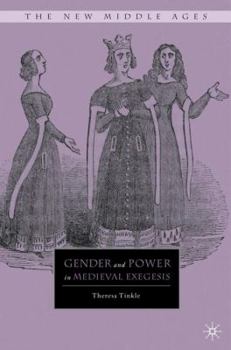Gender and Power in Medieval Exegesis
(Part of the The New Middle Ages Series)
Select Format
Select Condition 
Book Overview
Gender and Power in Medieval Exegesis analyzes the nexus of gender and power in biblical commentaries from the fifth to the fifteenth century, focusing on crucial moments in the development of exegesis. The argument pursues the literary trope of the woman on top through major literary-exegetical works: Augustine's Confessions, Jerome's Against Jovinian, the Fleury Slaughter of Innocents, and Chaucer's Wife of Bath's Prologue. Theresa Tinkle reveals...
Format:Hardcover
Language:English
ISBN:0230104355
ISBN13:9780230104358
Release Date:October 2010
Publisher:Palgrave MacMillan
Length:196 Pages
Weight:0.75 lbs.
Dimensions:0.6" x 5.5" x 8.3"
Customer Reviews
0 rating





